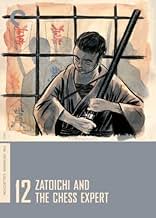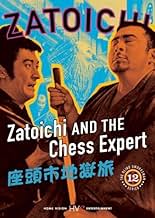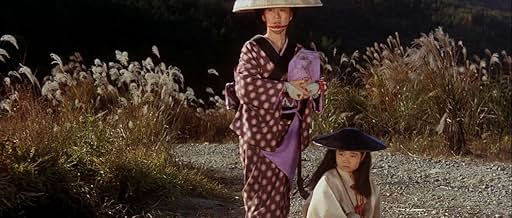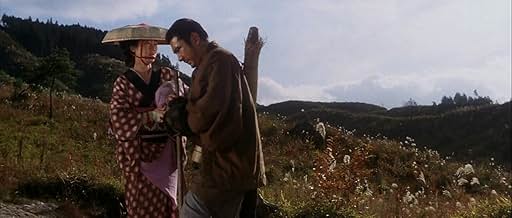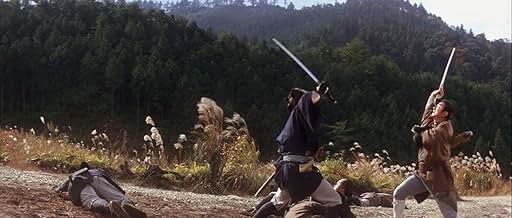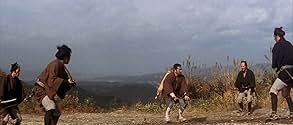VALUTAZIONE IMDb
7,3/10
1679
LA TUA VALUTAZIONE
Aggiungi una trama nella tua linguaA samurai with a high skill in chess makes friends with Zatoichi, who finds that things become peculiar in his presence.A samurai with a high skill in chess makes friends with Zatoichi, who finds that things become peculiar in his presence.A samurai with a high skill in chess makes friends with Zatoichi, who finds that things become peculiar in his presence.
Recensioni in evidenza
This is another good performance from Shintaro Katsu as Zatoichi. Also, the character, Jumonji, was very versatile. First, he befriends Zatoichi on a boat journey, where they play a game of chess. After they land in town, they stay at the same inn,and Zatoichi becomes the area masseur in the inn. Then, Jumonji finally challenges Zatoichi to a fight. What's really intriguing about this film is that the compassion that Zatoichi has for children. When the little girl thanks him for getting her the medicine needed to save her life, he gets all emotional and has to run outside. And another heartwarming scene is towards the end of the movie, when she helps Zatoichi with his shoes, he gets down and touches her face, before he moves on his journey.
If you don't like reading subtitles, or you don't like to watch foreign movies, and you don't have a fondness of Samurai sword action drama...don't read any further as its not for you!
A Japanese Chambara (sword fighting) film directed by Kenji Misumi and starring Shintaro Katsu as the blind masseur Zatoichi. It was originally released by the Daiei Motion Picture Company. Zatoichi and the Chess Expert is the twelfth episode in the 26-part film series devoted to the character of Zatoichi. It has also been known as Showdown for Zatoichi and Zatoichi's Trip to Hell.
Its an intricate tale of a blind expert swordsman, who travels the land as a masseur. He makes friends with a dangerous chess player, while fending off angry yakuza and bloodthirsty relatives out for revenge, and trying to save a sick child. As the film progresses we are introduced to other characters, some of whom have interweaving connections to both Zatoichi and the chess playing Samurai.
As is usual with the Zatoichi series of films/story's it is cleverly done; as has been done since the very first Chambara film of the early 1940's, '47 RONIN' (which incidently is a favourite of Keanu Reeves, hence the reason he starred in his own retelling of the ancient true story in 2013...a sequel is being made starting early 2021).
A Japanese Chambara (sword fighting) film directed by Kenji Misumi and starring Shintaro Katsu as the blind masseur Zatoichi. It was originally released by the Daiei Motion Picture Company. Zatoichi and the Chess Expert is the twelfth episode in the 26-part film series devoted to the character of Zatoichi. It has also been known as Showdown for Zatoichi and Zatoichi's Trip to Hell.
Its an intricate tale of a blind expert swordsman, who travels the land as a masseur. He makes friends with a dangerous chess player, while fending off angry yakuza and bloodthirsty relatives out for revenge, and trying to save a sick child. As the film progresses we are introduced to other characters, some of whom have interweaving connections to both Zatoichi and the chess playing Samurai.
As is usual with the Zatoichi series of films/story's it is cleverly done; as has been done since the very first Chambara film of the early 1940's, '47 RONIN' (which incidently is a favourite of Keanu Reeves, hence the reason he starred in his own retelling of the ancient true story in 2013...a sequel is being made starting early 2021).
Zatoichi and the Chess Expert is the twelfth entry in the franchise and one of the best movies about the blind masseur, skilled gambler and skillful swordsman. The story of this film is unusually clever, complex and twisted. Zatoichi meets a smart chess player while traveling on a ship and the two end up respecting one another so much that they start traveling together. When Zatoichi is attacked by some folks whom he tricked during a dice game on the ship, a young girl traveling with a beautiful woman gets injured, so Zatoichi organizes some medicine and travels with the two as he grows fond of the joyful child. Zatoichi also encounters a sick man and his sister who is disguised as a man to avoid trouble on the road who travel with a helpful retainer who gets brutally murdered during a prayer. Soon enough, these three seemingly different story lines end up being connected in most surprising ways as Zatoichi needs to figure out who is friend and who is foe.
What I really liked about this film is the complex story with its numerous clever twists. The characters also have great depth. Even Zatoichi seems more emotional than usual as he opens up about the love of his life and his low self-esteem while being caring, helpful and respectful to those who need his help. The perfectly portrayed chess expert is hard to figure out because of his harsh convictions versus his impressive intelligence. The young woman Zatoichi travels with falls in love with the blind samurai and is at times desperate and at other times joyful about their complicated relationship. Her child is quirky but polite and its heart-warming to see how the girl and Zatoichi grow fond of one another. The sick man, his mysterious sister and his helpful retainer are also quite intriguing characters. This movie is more than just a classic chambara film and also a drama for all the complex relationships going on and a thriller because of the cruel murder of the retainer. The movie's atmosphere gets more and more mysterious throughout the nicely paced film. The landscapes are memorable, gorgeous and authentic, especially the port and ship in the beginning of the film and the modest inn with the hot springs that plays a central role in this film. The fight scenes are more vivid than in the preceding film. Most sword fights occur at the beginning and in the final five minutes but they are nicely choreographed. My favorite fight scene was when Zatoichi got ambushed in the middle of the night in the muddy meadows while carrying the expensive medicine for the sick child.
There really isn't much to criticize regarding one of the franchise's very best films. Obviously, there are some recurring elements in the movie such as numerous gambling scenes, traditional sword fights and Zatoichi traveling through rural landscapes but these predictable elements give each film about the blind masseur their very own identity.
If you like sword fighting movies or care for Japanese culture, history and nature, you will particularly like Zatoichi and the Chess Expert. You an learns more about Japan in one hour and a half here than you could by watching anime for a whole year. Since this is one of the most profound entries in the franchise, this movie would be recommendable to get to know a true piece of Japanese art.
What I really liked about this film is the complex story with its numerous clever twists. The characters also have great depth. Even Zatoichi seems more emotional than usual as he opens up about the love of his life and his low self-esteem while being caring, helpful and respectful to those who need his help. The perfectly portrayed chess expert is hard to figure out because of his harsh convictions versus his impressive intelligence. The young woman Zatoichi travels with falls in love with the blind samurai and is at times desperate and at other times joyful about their complicated relationship. Her child is quirky but polite and its heart-warming to see how the girl and Zatoichi grow fond of one another. The sick man, his mysterious sister and his helpful retainer are also quite intriguing characters. This movie is more than just a classic chambara film and also a drama for all the complex relationships going on and a thriller because of the cruel murder of the retainer. The movie's atmosphere gets more and more mysterious throughout the nicely paced film. The landscapes are memorable, gorgeous and authentic, especially the port and ship in the beginning of the film and the modest inn with the hot springs that plays a central role in this film. The fight scenes are more vivid than in the preceding film. Most sword fights occur at the beginning and in the final five minutes but they are nicely choreographed. My favorite fight scene was when Zatoichi got ambushed in the middle of the night in the muddy meadows while carrying the expensive medicine for the sick child.
There really isn't much to criticize regarding one of the franchise's very best films. Obviously, there are some recurring elements in the movie such as numerous gambling scenes, traditional sword fights and Zatoichi traveling through rural landscapes but these predictable elements give each film about the blind masseur their very own identity.
If you like sword fighting movies or care for Japanese culture, history and nature, you will particularly like Zatoichi and the Chess Expert. You an learns more about Japan in one hour and a half here than you could by watching anime for a whole year. Since this is one of the most profound entries in the franchise, this movie would be recommendable to get to know a true piece of Japanese art.
I agree with the positive remarks left by others about the overall charm of this movie, but the real treasure is actor Mikio Narita (January 31, 1935-April 9, 1990.) He was one of the better character actors of his generation, which is obvious when you compare this performance to his portrayal of an effete imperial minister, who happens to be deadly with a sword, in "Shogun's Samurai", a/k/a "The Yagyu Clan Conspiracy." As Jumonji, Narita borrowed Sam Spade's unique gesture from "The Maltese Falcon," that is, when contemplating a problem, he rubs the side of his nose and then snaps his fingers when inspired with a solution. The script gives him plenty of opportunities to emerge as a full and unforgettable character, and his presence in this episode of the Zatoichi franchise is reason enough to see this film.
Zatoichi films are all pretty similar. There are gambling (dice) scenes, Zatoichi vs. large gang fighting scenes, massaging scenes (usually of beautiful women), Zatoichi eating and drinking scenes, bath scenes, travel sequences, often a scenes with a child (or children) - and they all wonderful. One other consistent element is that they all are shot in glorious widescreen and contain some exquisite cinematography. I always find at least a couple of scenes in each film of this series to be quite breathtaking - certainly worthy of pondering over. I find these films so appealing regardless that I know exactly what is to come.
In this chapter Zatoichi meets a rather confident and intelligent foe in the guise of a chess expert. This is, of course, after he has easily defeated all his lesser foes who seek vengeance on his gambling prowess (sound familiar?). We have a female love interest and Zatoichi spurning her because of his opinion of his own "lowlife" status. All in all I was more enthralled with the first 3/4's of this particular film, but felt it failed slightly at the end. Still I think the world of Zatoichi so I give this 4.5 /5
In this chapter Zatoichi meets a rather confident and intelligent foe in the guise of a chess expert. This is, of course, after he has easily defeated all his lesser foes who seek vengeance on his gambling prowess (sound familiar?). We have a female love interest and Zatoichi spurning her because of his opinion of his own "lowlife" status. All in all I was more enthralled with the first 3/4's of this particular film, but felt it failed slightly at the end. Still I think the world of Zatoichi so I give this 4.5 /5
Lo sapevi?
- QuizThis is the twelfth of 26 films to star Shintaro Katsu as Zatoichi
- ConnessioniFollowed by Zatôichi no uta ga kikoeru (1966)
I più visti
Accedi per valutare e creare un elenco di titoli salvati per ottenere consigli personalizzati
- How long is Zatoichi and the Chess Expert?Powered by Alexa
Dettagli
- Data di uscita
- Paese di origine
- Lingua
- Celebre anche come
- Zatoichi and the Chess Expert
- Azienda produttrice
- Vedi altri crediti dell’azienda su IMDbPro
- Tempo di esecuzione1 ora 27 minuti
- Proporzioni
- 2.35 : 1
Contribuisci a questa pagina
Suggerisci una modifica o aggiungi i contenuti mancanti

Divario superiore
By what name was Zatôichi jigoku-tabi (1965) officially released in India in English?
Rispondi
